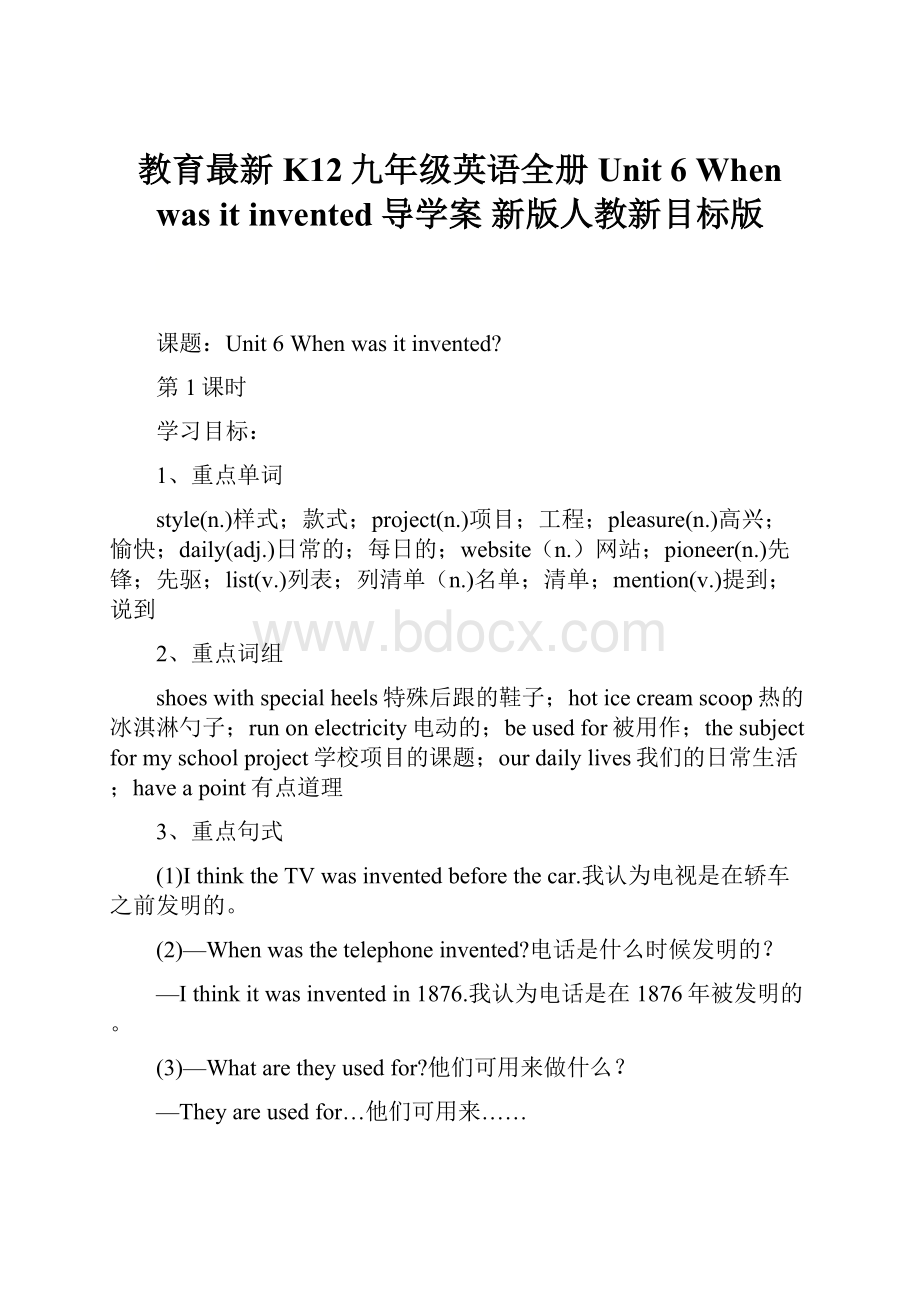教育最新K12九年级英语全册 Unit 6 When was it invented导学案 新版人教新目标版.docx
《教育最新K12九年级英语全册 Unit 6 When was it invented导学案 新版人教新目标版.docx》由会员分享,可在线阅读,更多相关《教育最新K12九年级英语全册 Unit 6 When was it invented导学案 新版人教新目标版.docx(26页珍藏版)》请在冰豆网上搜索。

教育最新K12九年级英语全册Unit6Whenwasitinvented导学案新版人教新目标版
课题:
Unit6Whenwasitinvented?
第1课时
学习目标:
1、重点单词
style(n.)样式;款式;project(n.)项目;工程;pleasure(n.)高兴;愉快;daily(adj.)日常的;每日的;website(n.)网站;pioneer(n.)先锋;先驱;list(v.)列表;列清单(n.)名单;清单;mention(v.)提到;说到
2、重点词组
shoeswithspecialheels特殊后跟的鞋子;hoticecreamscoop热的冰淇淋勺子;runonelectricity电动的;beusedfor被用作;thesubjectformyschoolproject学校项目的课题;ourdailylives我们的日常生活;haveapoint有点道理
3、重点句式
(1)IthinktheTVwasinventedbeforethecar.我认为电视是在轿车之前发明的。
(2)—Whenwasthetelephoneinvented?
电话是什么时候发明的?
—Ithinkitwasinventedin1876.我认为电话是在1876年被发明的。
(3)—Whataretheyusedfor?
他们可用来做什么?
—Theyareusedfor…他们可用来……
(4)ThezipperwasinventedbyWhitcombJudsonin1893.Butatthattime,itwasn’tusedwidely.拉链是由惠特科姆·贾德森在1893年发明的,但在那时,它并没有得到广泛应用。
重点难点:
重点:
一般过去时的被动语态。
难点:
一般现在时、一般过去时和一般将来时被动语态的区别。
导学设计:
1.pleasuren.高兴;愉快
—Canyouhelpmethinkofaninvention?
你能帮我想一个发明吗?
—Withpleasure.我很乐意。
Thecutetoybearpleasedtheboy.这个可爱的玩具熊让那个男孩很高兴。
Wearepleasedwiththepleasanttrip.我们对这次愉快的旅行很满意。
【归纳】
please(v.)
意为“取悦;使高兴;使满意”
pleased(adj.)
意为“高兴的;满意的”,常用于修饰_________。
bepleasedwith...意为“对……感到满意”
pleasant(adj.)
意为“愉快的;快乐的”;常用于修饰_________。
pleasure(n.)
意为“高兴;愉快”。
(It’s)mypleasure.我很乐意。
withpleasure很荣幸,很乐意
【现学现练】
(1)—CanIbringafriendtoyourbirthdayparty?
—Sure, .
A.noproblem B.notatall
C.mypleasureD.welldone
(2)Rememberingthepastwashisonly________(please).
(3)Ourteacher_____________(对……满意)ourschoolwork.
(4)Ithinkchattingwithmyparentsisa________(please)thing.
2.—Whataretheyusedfor?
它们是用来做什么的?
—Theyareusedforseeinginthedark.
它们是用来在夜间照明的。
beusedfor意为“被用作……”,其后接动词的-ing形式。
beusedfordoingsth.相当于beusedtodosth.,句子的主语通常是物。
Thiskindofspecialmaterialisusedformakingdresses.=Thiskindofspecialmaterialisusedtomakedresses.
这种特殊的材料是用来做裙子的。
【归纳】
(1)Imusicbeforesleep.我过去常常在睡觉前听歌。
(暗示现在不听了)
(21)Iinholidays.我习惯了在假期旅游。
(3)Thetreesplantedthesoilfrombeingblownaway.这些种植的树是用来防止土壤被风吹走的。
(4)Themachinecuttingthings.这台机器是用来切割东西的。
(5)EnglishaforeignlanguageinChina.在中国,英语被当作一门外语。
【现学现练】
(1)用介词for/as/by填空。
Englishisusedafirstlanguageinmanycountries.
Chopsticksareused_______Chinesepeopleandtheyareusedeatingdinner.
(2)LiuHuan,afamousmalesinger,haslonghair,becausehe longhair.
A.usedtohaveB.isusedtohaving
C.isusedforhavingD.isusedtohave
知识巩固:
Ⅰ.用所给词的适当形式填空
1.Potatochips(invent)byacookcalledGeorgeCrum.
2.It’smy(please)tohelpyouwithEnglish.
3.Everyonecan’tavoidmeetingsomeproblemsinhis(day)life.
4.Internetwasused(wide)inourlifenow.
5.Heseems(make)somemistakesinhiswork.
Ⅱ.单项选择
1.—Wouldyoulikesomecoffee,please?
—Yes,andpleasegetsomesugar.Iprefercoffee sugar.
A.to B.for C.with D.from
2.—What’sthecupused ?
—Servingwine.
A.asB.forC.toD.in
3.—Whydoyouspeakin aloudvoice?
—BecauseIwanttomakemyself clearly.
A.such;hearB.so;heard
C.such;heardD.so;hear
4.The31thOlympicGames fromAugust5thto21thin20164inRiodeJaneiro.
A.heldB.holdsC.washeldD.isheld
5.Edison thelightbulbandColumbus America.
A.discovered;discoveredB.invented;discovered
C.invented;inventedD.discovered;invented
参考答案:
导学设计:
1.【归纳】人;物【现学现练】
(1)C
(2)pleasure(3)ispleasedwith(4)pleasant
2.【归纳】
(1)usedtolistento
(2)isusedas(3)areusedtokeep(4)isusedfor(5)amusedtotraveling【现学现练】
(1)as;by
(2)B
知识巩固:
Ⅰ.1.wereinvented2.pleasure3.daily4.widely5.tomake
Ⅱ.1-5CBCCB
课题:
Unit6Whenwasitinvented?
第2课时
学习目标:
1、重点单词
nearly(adv.)几乎;差不多;ruler(n.)统治者;支配者;boil(v.)煮沸;烧开;remain(v.)保持不变;剩余;smell(n.)气味(v.)发出……气味;闻到;national(adj.)国家的;民族的;doubt(n.)疑惑;疑问(v.)怀疑;fridge(n.)冰箱;low(adj.)低的;矮的;somebody(pron.&n.)某人;重要人物;translate(v.)翻译;lock(v.)锁上;锁住(n.)锁;earthquake(n.)地震;sudden(adj.)突然(的);biscuit(n.)饼干;cookie(n.)曲奇饼;instrument(n.)器械;仪器;工具
2、重点词组
byaccident偶然,意外地;aChineserulercalledShenNong一位叫神农的中国统治者;overtheopenfire在火堆上;fallintothewater落入水中;maketea泡茶;takeplace发生;出现;withoutdoubt毫无疑问;的确;thesaintoftea茶圣;atalowprice以一个很低的价格;takethesephotos拍这些照片;gooutalone单独外出;translatethebookintodifferentlanguage把书翻译成不同种的语言;allofasudden突然;猛地;workon从事,进行
3、重点句式
(1)Doyouknowthattea,themostpopulardrinkintheworld(afterwater),wasinventedbyaccident?
你知道茶,(继水之后)世界上最受欢迎的饮料,是被偶然发明的吗?
(2)Manypeoplebelievethatteawasfirstdrunknearly5,000yearsago.许多人相信茶是在将近五千年前首先喝的。
(3)Anicesmellwasproducedwhenthetealeavesdroppedintothehotwater.当茶叶落入热水中时发出一种很香的味道。
(4)Italsodiscusseswherethefinesttealeaveswereproducedandwhatkindsofwaterwereused.它也讨论了什么地方出产最好的茶叶并且用什么样的水。
(5)ItisbelievedthatteawasbroughttoKoreaandJapanduringthe6thand7thcenturies.已确信茶是在六到七世纪期间被带到韩国和日本的。
(6)—Whenwasthezipperinvented?
拉链是什么时候发明的?
—Itwasinventedin1893.它是在1893年被发明的。
(7)—Whowasitinventedby?
它是由谁发明的?
—ItwasinventedbyWhitcombJudson.它是被惠特科姆·贾德森发明的。
(8)Thestudentsweretoldnottoeatordrinkinclass.学生们被告知在课堂上既不吃或喝任何东西。
学习重难点:
重点:
学会区分主动语态和被动语态。
难点:
培养想象力及观察事物的能力。
导学设计:
1.takeplace发生;出现
TheteatradefromChinatoWesterncountriestookplaceinthe19thcentury.中国和西方国家的茶贸易出现在19世纪。
Greatchangeshavetakenplaceinthepastfewyears.过去的几年发生了很大的变化。
TheearthquakehappenedinJapaninAugust,2016.2016年8月在日本发生了地震。
Ihappenedtoknowthatheworkedinthiscity.我碰巧知道了他在这个城市上班。
【归纳】takeplace和happen
takeplace
takeplace表示“发生;举行;举办”,一般指非偶然性事件的“发生”,即这种事件的发生一定有某种原因或事先的安排
happen
happen作“发生;碰巧”解,一般用于偶然或突发性事件
【现学现练】
(1)Thesportsmeetingwill inSeptember.Manystudentswanttobevolunteers.
A.takeplaceB.takepart
C.takeactionD.takecare
(2)Theaccident onarainynight.
A.wastakenplaceB.happened
C.washappenedD.tookplace
(3)Jimdidn’tcometoschool.Doyouknow ?
A.whathappenedtohimB.whathehappened
C.whatwashappenedtohimD.whatdidhehappen
2.ItissaidthataChineserulercalledShenNongwasthefirsttodiscoverteaasadrink.据说中国的一个统治者神农是第一个发现茶叶可以作为一种饮料的人。
【归纳】
(1)Itissaidthat...意为“据说;人们说”,是Peoplesaythat...的被动语态形式,其中it是形式主语,后面的that从句是真正的主语。
It’ssaidthatteawasinventedbyaccident.=Peoplesaythatteawasinventedbyaccident.据说茶是偶然被发明的。
(2)与Itissaidthat...类似的句型有:
①Itisbelievedthat...人们认为……
②Itissupposedthat...据猜测……
③Itisreportedthat...据报道……
④It’sknownthat...众所周知……
【现学现练】
(1)据报道,中国将于2022年举办第24届冬奥会。
电影节。
_________________thatChinawillhostthe24thWinterOlympicGamesin2022.
(2)据说他是位乐于助人的人。
_________________heisamanwhoisreadytohelpothers.
(3)众所周知杭州以西湖而出名。
_________________HangzhouisfamousforWestLake.
3.remainv.保持不变;剩余
Someleavesfromateaplantfellintothewaterandremainedthereforsometime.
茶树的叶子掉进水里,停留了一段时间。
Afterthebigfire,nothingremained.这场大火后,什么也没剩下。
Hehadtoremaininhospitaluntilhewasbetter.他不得不一直住院直到身体好些。
【归纳】
(1)用作不及物动词,意为“剩下;剩余;遗留”,此时不能用进行时态,也没有被动语态。
(2)用作连系动词,指某人或某事物仍保持某种状态,意为“仍然;依旧”,可接名词、形容词、介词短语、分词作表语。
Itasecret.它仍然是个秘密。
Whateverachievementsyou’vemade,youshouldmodest.无论你取得多么大的成就,你都该保持谦虚。
Theguestscamein,butshesittingatthedeskreadingbook.客人们都进来了,但她还坐在写字台旁读书。
【现学现练】
(1)他不得不待在车站过夜。
Hehadto_________thebusstationforthenight.
(2)Aftertheearthquake,verylittle inthecityofTangshan.
A.remainedB.wasremained
C.isremainedD.remains
4.一般现在时的被动语态
(1)IthinktheTVwasinvented(invent)beforethecar.I
(2)Butatthattime,itwasn’tused(notuse)widely.
(3)Whenwasteabrought(bring)toKorea?
(4)Whowasitinvented(invent)by?
【归纳】1.一般过去时被动语态的构成:
was/were+及物动词的过去分词
2.一般过去时被动语态的各种句式
肯定句
主语+was/were+及物动词的过去分词+其他.
否定句
主语+was/were+not+及物动词的过去分词+其他.
一般疑问句
Was/Were+主语+及物动词的过去分词+其他?
特殊疑问句
特殊疑问词+一般疑问句式?
3.使用被动语态应注意的几个问题
(1)不及物动词没有被动语态。
这个故事发生在一个小山村里。
Thestory_________inasmallvillage.
(2)感官动词或使役动词使用省略to的动词不定式,主动语态中不带to,但变为被动语态时,必须加上to。
常见的动词有:
make,let,see,hear,notice,watch等。
Hismothermakeshimdosomehouseworkeveryday.→Heismade_____somehouseworkeverydaybyhismother.
他妈妈每天让他做些家务。
(3)动词带双宾语,改为被动句时,如果把直接宾语改为被动句的主语,间接宾语的前面需加介词to或for,这要取决于和它搭配的动词。
Iboughtmysonatoyforhisbirthday.→Atoywasboughtmysonforhisbirthday.
我为儿子的生日买了一件玩具。
Hedidn’tgiveherthebook.→Thebookwasn’tgivenherbyhim.他没有给她那本书。
(4)动词短语在被动句中要保持它的完整。
那位老人由他的孩子们照料。
Theoldman_____________byhischildren.
【现学现练】
Ⅰ.单项选择
1.Flowers alongtheroadlastyear.
A.plantB.plantedC.areplantedD.wereplanted
2.Linda toMary’sbirthdaypartyyesterdayandtheyhadgreatfun.
A.isinvitedB.wasinvitedC.willbeinvitedD.invited
3.Somemoneywaslent himbyMrGreen.
A.at B.forC.to D.with
4.Inthepast,he whathewasnotinterestedin.
A.weremadedoB.wasmadetodo
C.madetodoD.madedo
5.Thechildrenwerehungryandthesaladwasquickly .
A.eatingupB.ateupC.eatenupD.eatsup
Ⅱ.将下列主动句变为被动句
1.Theyfoundthelostboyunderabridgelastnight.
Thelostboy____________themunderabridgelastnight.
2.Tonysentane-mailtoJacklastnight.
Ane-mail__________JackbyTonylastnight.
3.Didshewashtheclothesyesterday?
_____theclothes_______byheryesterday?
4.Theydidn’ttellhimthenewsimmediately.
Thenews__________tohimbythemimmediately.
5.Whendidtheyfinishthework?
When____thework_______bythem?
知识巩固
Ⅰ.单项选择
1.Pizzaisreadynow,andit